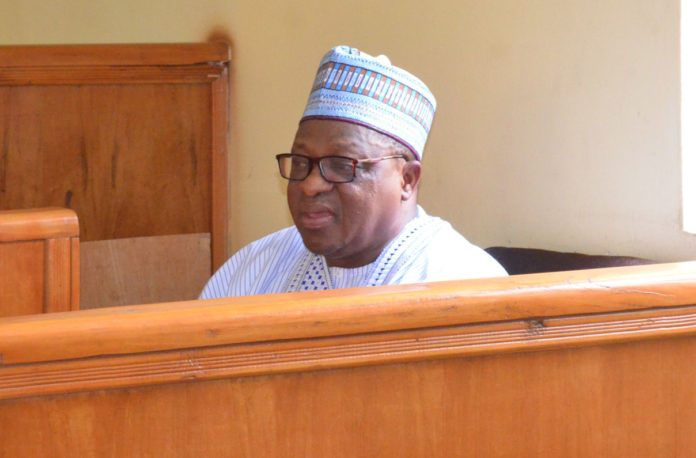The Court of Appeal in Abuja has reduced the jail term of ex-Governor Joshua Dariye to 10 years.
Mr Dariye, a former Plateau State governor, was in June sentenced to 14 years in prison by the high court.
However, the appeal court on Friday said while the conviction was right, the former governor should have been jailed for 10 years.
The court reduced the sentence of 14 years to 10 years for criminal breach of trust while a similar conviction for diversion of N1.62 billion ecological funds was reduced from two years to one year. The sentences are to run concurrently, like the previous judgement in June, meaning Mr Dariye has now been effectively jailed 10 years.
The appeal court ruled that the lower court aired in law when it sentenced Mr Dariye, a first time offender, to the maximum 14 years term contained in the charge against him.
According to the court, the sentence was handed down in the season of the Administration of Criminal Justice Act which does not allow maximum sentence for first time offenders.
It would be recalled that High Court of the Federal Capital Territory, Gudu, Abuja, presided by Justice Adebukola Banjoko on Tuesday, June 12, 2018 sentenced Mr Dariye who was a serving senator to 14 years’ imprisonment on charges of criminal breach of trust and criminal appropriation of the state’s funds.
The ex-governor was convicted on 15 out the 23 counts preferred against him in July 2007.
CONVICTION HISTORY
In June, when Mr Dariye was first jailed, his lawyer and that of the EFCC summarised their arguements.
Starting with the issues raised by Mr Dariye’s counsel, Mrs. Banjoko said Mr Dariye’s lawyers, led by former Attorney General of the Federation, Kanu Agabi, contended that the charge against the defendant was defective for a number of reasons.
According to Mr Agabi, the fact that the charge sheet against his client did not indicate that the diverted funds were taken “dishonestly” meant that a case of fraudulent intention could not be proven against Mr Dariye.
Mr Agabi, a former attorney general of the federation, also submitted that the prosecution had a duty to present all the participants in the said diversion, to court as witnesses.
The Senior Advocate of Nigeria further argued that failure of the prosecution to present all the participants rendered their evidence defective.
Mr Agabi also submitted that the prosecution ought to have been bound by the findings of the Plateau State Assembly committee which found no case against the defendant.
Similarly, Mr Agabi said the case against his client should have been viewed with the principle of “estoppel” which requires that once a ruling is delivered regarding a given issue, no other court should commence trial on a case of similar composition with the one already decided upon by the sister court.
Mr Agabi cited a previous ruling where six bankers were tried for their alleged involvement in the said transfer while Mr Dariye served as governor.
He contended that since the Federal High Court in Kaduna acquitted the bankers for lack of evidence, the trial of Mr Dariye on the same diversion amounts to an abuse of court process. According to Mr Agabi, the fate that befell the bankers should also be advanced on his client.
Mr Agabi further argued that the evidences adduced by the same prosecution in both trials were incoherent.
EFCC’s Argument
On their part, the prosecution, led by Rotimi Jacobs asked the court to determine whether having recourse to the evidence adduced in court, the prosecution was yet to prove its case against the defendant.
Mr Jacobs responded to Mr Agabi’s submissions regarding the bankers. He cited English Criminal laws to prove that the principle of estoppel did not apply to criminal cases.
He also argued that the evidences presented in Mr Dariye’s case were conclusive for the case in which they were brought and in compliance with section 173 of the evidence act.
Judge’s response
The judge said the issues raised by the defence, included fundamental matters that needed to be analysed.
She cited parts of the judgement from the previous ruling mentioned by Mr Agabi.
Mrs Banjoko said the ruling of the federal court acquitting the bankers was premised on the fact that the prosecution did not include the principal actor in the case of misappropriation.
Reading through the previous judgement, Mrs Banjoko said failure of the EFCC to include Mr Dariye in the charge meant that “no iota of evidence was adduced in court to show that the cheques (acted upon by the bankers) were fraudulently procured.”
“I am unable to see how the disbursement has shown any dishonest misappropriation. Did Mr Dariye misappropriate it for himself? If so, no evidence was shown,” Mr Banjoko stated while reading through the previous judgement by the federal high court judge, Liman J.
“It is clear from the above that the facts and evidence of misappropriation were not brought to the fore,” Mrs. Banjoko said.
She said that the decision of the federal court to discharge the bankers was accurate except that it was due to the absence of Mr Dariye in that trial.
Mr Dariye was not included in the 2005 trial of the bankers and their bank (defunct All States Trust Bank) because he was in office as governor of Plateau State and then enjoyed immunity from prosecution.
Although the bankers were acquitted, the bank was found guilty as charged.
Reacting to Mr Agabi’s argument that the prosecution ought to have presented same witnesses as those adduced during the trial of the bankers, Mrs Banjoko said it is not inconceivable to deduce that the class of evidence to prove a case of misappropriation was not the same as the class of evidence to prove the offence of aiding the said diversion.
On the controversial acquitting of Mr Dariye by the Plateau State House of Assembly committee, Mrs Banjoko said the committee had recognised its inability to proceed with investigations into the offence against Mr Dariye following the filing of the matter in court.
She said the committee noted that the matter had become subjudice and was about suspending its investigation before it dramatically announced a decision, discharging Mr Dariye from allegations against him.
“That conclusion was gotten from the air,” Mrs Banjoko said.
Regarding the allegations that the statements made by the defendant were given in duress, the judge said the defendant’s counsel should have raised the objection ahead of his final address to the court.
“Learned silk ought to have advanced his objection during the trial,” Mrs Banjoko said.
“In the absence of concrete evidence justifying these payments, it can safely be described as misappropriation,” Mrs Banjoko said.
Mrs Banjoko found Mr Dariye guilty of 15 out of the 23-count charge brought against him.
Mr Dariye was convicted for two main categories of offences, namely criminal breach of trust which attracts a two year sentence for each affected count and criminal misappropriation which has a penalty of 14 years.
The sentences are to run concurrently which means he will spend a maximum 14 years in jails.













